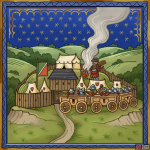Text
A military camp near Kuttenberg remained in place for several months, requiring all the essentials of civilian life, including field baths, an apothecary, a clergyman, a mess hall, supply tents, and a sizable contingent of courtesans and prostitutes.
Many soldiers embarked on their journey with their families, and hundreds of other “civilians” joined the camp for practical reasons. There was always a need for cobblers, armorers, blacksmiths, bakers, and others. As a result, there were often more non-combatants than soldiers in the camp.
To sustain the camp so-called provisioning units were sent out into the surrounding areas. These were soldiers charged with getting provisions at whatever cost. In calmer times, the provisioners normally paid peasants for their food; in more desperate times, they took what they could find. Getting enough sustenance for a crowd of many thousands was a question not only of survival but of morale. Without morale there is no army, without an army there is no campaign…
Hygiene was a critical factor for any military camp, as many campaigns ended due to epidemics of dysentery or typhus before they even began.


No Comments